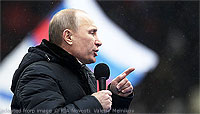Pundits argue that Putin became a symbol of stability, but his policy should be adjusted to future challenges

(Interfax – October 7, 2012) President Vladimir Putin, who has turned 60 on Oct. 7, has gone down in history already as a statesman, who has put Russia back on the path of stability. However, demand has been growing in Russia for “a new Putin,” strong enough to accomplish fresh breakthroughs, political analysts say.
“Russia approached the 21st century on the brink of a social explosion and of a deep split in the government and society. Putin’s first team proposed the so-called ‘positive reaction’ policy, whose target was to freeze the conflicts and to make elections manageable – a policy that brought about a fairly good result,” Gleb Pavlovsky, President of the Foundation for Effective Politics, told Interfax.
“A rather original system of Putin-managed social state emerged against the backdrop of an excellent situation on the raw materials market. The money gained from raw materials exports provided a source for lending and for subsidizing pensions and wages,” he said.
Whatever one may think about Putin’s political course, Russia’s incumbent president has serious assets on his credit side, Pavlovsky said.
“Economic growth and other indices were quite impressive, although it is hard to say how impressive they would have been if prices on energy had not been so advantageous. Putin must be given credit for achieving appeasement in the Caucasus and ending the war, and for the pension and wage indexation and general stability,” he said.
Overall, Putin’s performance as a high-level statesman looks quite convincing, Pavlovsky said. Quite a few successes were scored during Putin’s two presidential terms and during Dmitry Medvedev’s presidency within the tandem, which was in fact Putin-style,” the analyst said.
However, for all apparent successes, Putin has been tackling a host of new factors that have been an impediment to his course of economic progress.
“A deformation is being observed in the Russian business medium, where high achievements are being demonstrated by sectors that have established good relations with the Kremlin and remain within its zone of influence. Small and medium businesses have been making no headway at all and society has been turning into a community of petty rentiers, with their interest focused solely on indexation and diverted away from innovation, to say nothing of entrepreneurship as such,” Pavlovsky said.
The current presidential term may come out to be one of the most difficult for Putin who, according to Pavlovsky, may have doubts about how strongly he may rely on his team.
“Putin in his third term is the leader who does not know, six months after being elected, who the people he may rely on actually are. He has doubts about which program may be proposed. He is hesitant, fearing to alienate the supporting forces. However, drawing the pause out to a greater length would be very dangerous. I think Putin’s third term will begin in the most complicated and depressive way,” the expert said.
Quite a few groups in Putin’s entourage remain inert at a time when society’s demand for breakthroughs is becoming increasingly obvious, he said.
“Putin’s current role is so central, that if he himself shows indecision on some issues, the rest will remain undecided, too. In a way, society expects Putin to accomplish an even stronger breakthrough than the ones he carried through in 2000 and in 2004. It is hard to say whether he will find enough strength to implement it. It looks like the potential of his current team is not sufficient for it,” Pavlovsky said.
Igor Yurgens, the head of the Contemporary Development Institute (INSOR), said that on his 60th birthday Putin has found himself under the pressure of the groups who want him to pursue a political course, formulated back in the 19th century.
“A large pressure group is pushing Putin towards a course based on three principles – Orthodoxy, autocracy and nationalism – which, if adopted, would signify that Putin has backtracked on what he has been doing since 2001. Meanwhile, this course is being advertised to Putin as a strategy of saving support coming from the majority who back Putin for stability, and of saving the reliance on material, financial and other circumstances,” he said.
Putin played different roles at different times, from that of a European liberal to a stern advocate of a strong state, with a conservative course prevailing these days.
“I would conventionally divide Putin’s activities into four periods. He was liberal-minded and Europe-oriented between 2000 and 2004, and he was a rigorous advocate of a strong state between 2004 and 2008, who, for various external and internal reasons, would put on an equal footing supporters of market development and rigorous state control; West-oriented groups and Slavophiles. He took a pause for himself and for the country in 2008. And, finally, he came back riding a wave, again under the pressure of external and internal circumstances, and he has now assumed a conservative stance with an emphasis on traditions,” Yurgens said.
What will happen next on the domestic scene largely depends on which course Putin will finally opt for, he said.
“Stability once chosen by Putin seems imaginary now. The president must finally decide which goal and strategy he will chose, and he will probably have to think how the course towards Orthodoxy, autocracy and nationalism, advocated by a pressure group, once worked out for the Russian empire,” Yurgens said.
“The president has two options. He may become the leader of progress, or he may put the stake on the so-called stability and, for that matter, become the leader of regress with an easily predictable end result,” he said.
